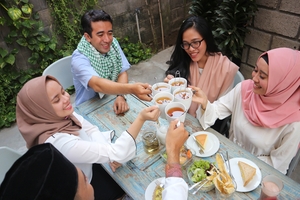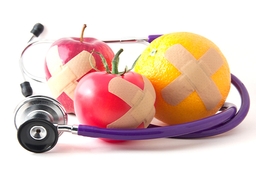Be Mindful of Your After-Meal Drinking Habits

What drink do you typically order when dining out? Tea, juice, or coffee? In Indonesia, these three drinks are commonly served as a complement to dishes. The effectiveness of nutrient absorption is determined by the type of drink we consume. So, what should you drink?
Every country has its own eating habits. Similarly, Indonesia. One of them is the type of beverage consumed following a meal.
Perhaps we can confidently state that the healthiest drink is plain water. It is, indeed. Water is the best drink for transporting swallowed food to the digestive system.
What about other beverages? Let’s go over the various types of drinks that Indonesians drink after eating one by one.
1. Tea

Iced tea on hot days and hot tea on rainy days—what a perfect match for the food, right? However, drinking tea immediately after eating is not a good idea.
Tea contains tannins, which are chemical compounds that give tea its astringent and bitter flavor as well as its distinctive color. When taken after meals, this compound actually inhibits iron absorption.
It is also not advisable to drink tea before meals or on an empty stomach. Tannins, in addition to making food tasteless, cause nausea and constipation and inhibit protein absorption.
On the plus side, tea tannins can act as antioxidants and anti-inflammatories. It is unquestionably beneficial to one's health. This, however, requires further investigation.
Tea is best consumed half an hour before or half an hour after eating. Choose a tea with a light color, such as green tea or herbal tea. If you must take medicine after eating, avoid taking it with tea (unless your doctor allows it).
2. Orange juice

Orange juice is superior to tea as an after-meal beverage. Oranges can help lower bad cholesterol, which is especially important if you eat a lot of meat. Heart disease risk is also reduced.
Then, if tannins inhibit iron absorption, vitamin C in orange juice actually promotes it. Vitamin C fosters the formation of red blood cells, which ensures that the body receives adequate oxygen. As a result of being full, we will not feel weak or sleepy.
Oranges also contain antioxidants that help to keep blood vessels and the heart healthy. Make your blood pressure more stable.
Furthermore, orange juice with no added sugar will not increase your calorie intake because sweet orange itself only contains about 62 calories.
During the COVID-19 pandemic, we are often advised to consume vitamin C to strengthen the body's immunity. Well, oranges are a perfect source of vitamin C. As an antioxidant, this vitamin can protect against free radicals and reduce the risk of inflammation.
Drinking orange juice after eating is beneficial. But you should also pay attention to the condition of your body, especially if you have stomach problems. Avoid drinking too much orange juice. If side effects occur, discontinue use immediately and consult a doctor.
3. Fruit or vegetable juice

Some restaurants provide fruit or vegetable juices on their menus. Juice is made by chopping and mashing fruits, vegetables, or both. It's usually served cold in a pretty glass.
Many people believe that drinking juice after a meal is healthier than drinking tea or coffee. How is it not? It comes from fruits and vegetables anyway. Well, this is where we must be cautious because most of the important nutrients found in fruits and vegetables are lost during the manufacturing process.
Fiber is supposed to be obtained from fruits and vegetables. Fiber facilitates digestion and maintains a feeling of fullness. However, fiber is destroyed and even lost during the juice-making process.
That's why, if you are on a mission to lose weight, avoid drinking juice after eating. Instead of decreasing, your calories will increase. Especially if you sweeten it with sugar, honey, sweetened condensed milk, boba, or ice cream.
Obesity and weight gain are also causes of other health issues such as hypertension, stroke, and diabetes. To meet nutritional needs, eat fruit and vegetables in their natural form rather than drinking juice.
4. Coffee

There are many different types of coffee, and everyone has their own way of drinking it. Coffee causes different reactions in everyone. Based on these findings, it is either good or bad to drink coffee after meals; of course, this cannot be standardized.
Coffee is the most common source of caffeine. Caffeine content in a cup of coffee is approximately 95 mg. This varies according to the type and brand of coffee. However, the range is almost 0 to 500 mg.
Generally, drinking coffee after a meal can disrupt iron absorption by up to 80%. Mineral absorption, such as zinc, magnesium, and calcium, decreases as coffee improves intestine movement and speeds up digestion.
Although coffee is high in antioxidants, not everyone's digestive system can withstand the effects of excessive caffeine consumption. Some people may even become ill shortly after drinking coffee.
Therefore, we need to know how our body reacts to coffee. If it is negative, it is best to avoid it. Drink no more than two cups of coffee per day. This will keep us from experiencing symptoms like anxiety, unrest, sleep disorders, and irregular heartbeat.
5. Milk

Indonesians aren’t strangers to the slogan "Empat Sehat Lima Sempurna." It has been part of the Indonesian government's campaign since 1955. The goal is to make people understand the right eating patterns, i.e., main dish, side dish, vegetables, fruits, and milk.
Now the question is whether those right eating patterns should be present in every portion of our meals. Is drinking milk after eating really good for our health? Let’s check the facts.
Milk is best consumed at night, according to Ayurveda, India's alternative health system. Because milk is high in nutrients, it is difficult for the body to digest. This will make you sleepy. You now understand why you feel bloated and sleepy after drinking milk.
Milk, on the other hand, is not for everyone. Some people are intolerant or allergic to certain foods. As a result, not only do you get protein and calcium, but you also get stomach pain, swelling, and an allergic reaction. Each person reacts differently to milk.
If you want to lose weight or build muscles, drink milk after exercise. However, don't exaggerate too much. Calculate the amount and type of other foods you consume.
In terms of quenching thirst, there is no clear winner among the five beverages listed above. Nonetheless, in terms of nutrition, water is still the best drink. Drink plenty of water and stay hydrated.



